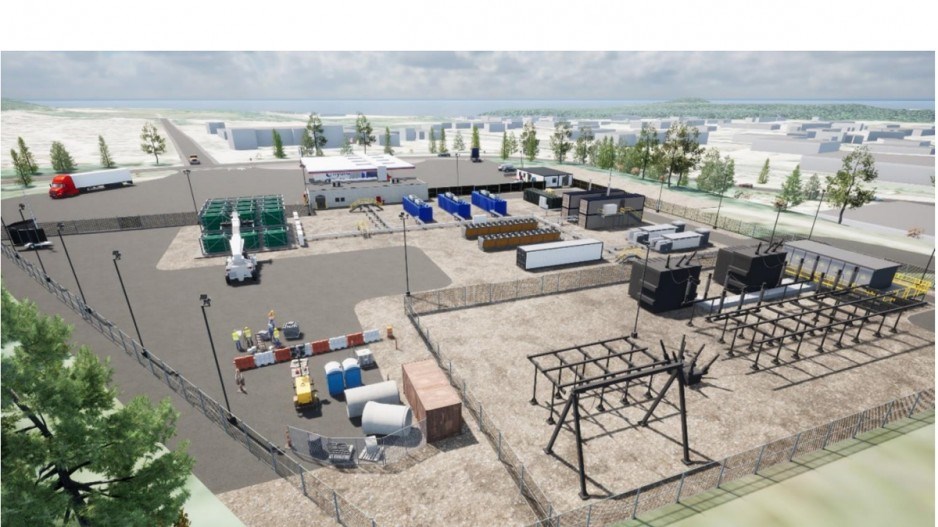Efforts are underway in Prince George, B.C. to move the needle on a hydrogen hub in the region, including partnership building, streamlining processes, and development of investor materials.
The city of more than 86,000 people has been recognized as an ideal area to develop a central B.C. hydrogen hub, and has received $150,000 over two years from the B.C government to advance a project.
“ … Using our advantages, our existing location advantages, we are going to sort of act as a guinea pig for our central, northern B.C. community counterparts through the permitting, opportunities, engagement and learnings and lessons as we go, and build in partnerships along the way,” said Deklan Corstanje, manager of economic development at the City of Prince George.Energy Evolution newsletter
“We are going to try to find out where hydrogen fits, where it’s most impactful, where it can step in where electrification and other low-carbon fuels may not be as effective — and hopefully, ultimately streamlining and clarifying the processes and making time to production and to markets as fast and as smooth as possible.”
He spoke during Supporting BC’s Hydrogen Sector with Geological Research and Community Action, a recent online event.
A City of Prince George staff report to council in March 2023 described the project as having an “emphasis on partnership, outreach and engagement, policy improvements, and awareness promotion, with the goal of creating and maintaining momentum to grow the hydrogen economy.”
Corstanje noted that Prince George, the largest centre in northern B.C., is already home to some hydrogen projects, including one by Hydra Energy. The company will have a hydrogen refuelling station operational in the city in 2024.
Regarding advantages, Corstanje also pointed to the city’s logistical benefits, located on key highways, accessing the majority of the province’s landmass, along with an international airport.
“We have already started to build a network of partners and opportunities,” said Corstanje, singling out Geoscience BC as one partner example.
“We have spoken to a good chunk of our regional and local partners, municipalities, First Nations, and Indigenous groups, business groups, you name it. We are continuing to expand that.”
Prince George has a role to play in supporting neighbouring communities, and sees their value in developing a healthy hydrogen sector, according to Corstanje.
For instance, the project is including input from Prince Rupert on permitting hydrogen sector projects, providing proponents clarity around permitting at the community level at both ends of the region, he said.
“We are going to be working through a permitting and case study where we will take some proxy project scenarios and do some dry runs through how we would process them, find our speed bumps and clarify that for ourselves,” he added.
As this information is collected, it will be shared across relevant corridors.
“As we know, when new technology projects come along, it can be a little bit of a shock, but if our community counterparts are prepared and understanding and educated on how things work and how they could go, not only can we support that development … we may benefit from their development in our communities,” Corstanje explained.
On top of that, he added, the plan is to produce “well-researched” resources for investors and proponents, and speak to the economic opportunity across the region.
“Then, [speak] to industry, community leaders, Indigenous groups, industry associations, to learn about concerns and perceived opportunities, as well just speak about the regional and economic opportunity for central and northern B.C.
“At the end of it all, we will summarize it and be able to share that information with the public, and other communities and industry and hopefully speak to how we can move towards next steps.”
So far, said Corstanje, the project — which will run to the end of 2024 — has involved speaking to local and regional entities, and incorporated region-specific opportunities for central and northern B.C.
“The permitting case study is underway, and we are continuing to reach out to industry,” he added.
The permitting case study and opportunity assessment are expected to be complete in the fourth quarter of this year.
Office work: Clarity
The online event included a presentation from David Coburn, director of the B.C. Hydrogen Office.
He described this office as a “one-stop-shop for energy proponents to help them navigate the regulatory process and come to positive final investment decisions on their projects.”
Furthermore, he said, it is working to engage First Nations, communities and organizations in collaborative dialogue to ensure “First Nations, particularly, can participate in clean energy opportunities in B.C.”
“Moving forward, there is still a lot of work for us to do,” continued Coburn. “We are now looking to complete a regulatory mapping study. This report will help to provide clarity on the regulatory landscape in B.C., will be used to inform discussions on any regulatory gaps that need to be addressed as this hydrogen sector develops further.”
A timeframe on the release of this report has not been determined.
“We continue to work … very collaboratively with industry, First Nations, and municipalities to explore the potential for developing hydrogen projects and regional hydrogen hubs where production and demand can be co-located,” Coburn said.




